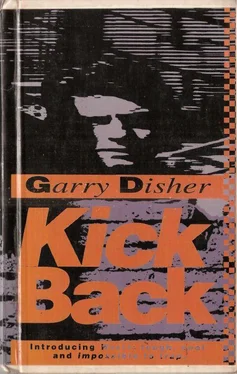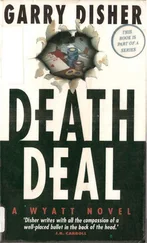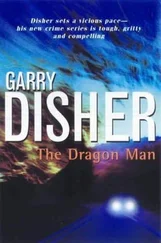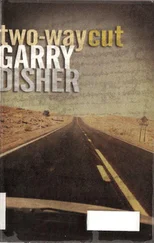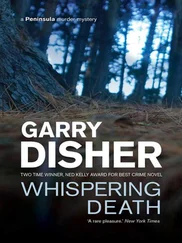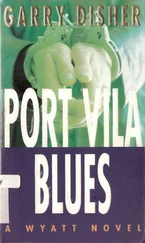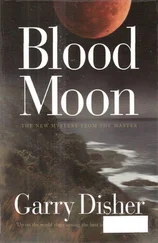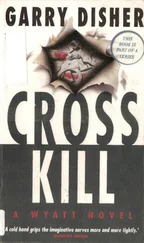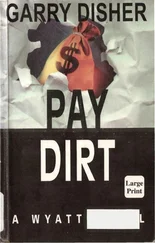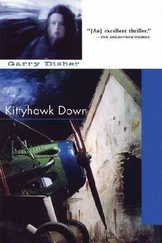Garry Disher - Kick Back
Здесь есть возможность читать онлайн «Garry Disher - Kick Back» весь текст электронной книги совершенно бесплатно (целиком полную версию без сокращений). В некоторых случаях можно слушать аудио, скачать через торрент в формате fb2 и присутствует краткое содержание. Жанр: Криминальный детектив, на английском языке. Описание произведения, (предисловие) а так же отзывы посетителей доступны на портале библиотеки ЛибКат.
- Название:Kick Back
- Автор:
- Жанр:
- Год:неизвестен
- ISBN:нет данных
- Рейтинг книги:3 / 5. Голосов: 1
-
Избранное:Добавить в избранное
- Отзывы:
-
Ваша оценка:
- 60
- 1
- 2
- 3
- 4
- 5
Kick Back: краткое содержание, описание и аннотация
Предлагаем к чтению аннотацию, описание, краткое содержание или предисловие (зависит от того, что написал сам автор книги «Kick Back»). Если вы не нашли необходимую информацию о книге — напишите в комментариях, мы постараемся отыскать её.
Kick Back — читать онлайн бесплатно полную книгу (весь текст) целиком
Ниже представлен текст книги, разбитый по страницам. Система сохранения места последней прочитанной страницы, позволяет с удобством читать онлайн бесплатно книгу «Kick Back», без необходимости каждый раз заново искать на чём Вы остановились. Поставьте закладку, и сможете в любой момент перейти на страницу, на которой закончили чтение.
Интервал:
Закладка:
Of all the stories in his head, Sugarfoot far preferred this one. After seeing The Long Riders he liked to go back over the action, fine-tuning it.
In another story he sometimes played with, his end is witnessed by a huge crowd and millions of viewers, television cameramen in risky positions filming him picking off Asians, wogs and poofters with AIDS-pinched faces. The government tries to play down his death and his funeral, but it’s impossible, he’s hit a nerve with the people.
But it was a problem getting all the details right in that one.
So he rewound the video. A new story came to him. In this one he uncovered the job Wyatt was bankrolling and picked him off and ran with the take.
Five
Wyatt dumped Sugarfoot Younger’s pistol in the nearest storm drain, then drove away from the city, pushing south through the wintry night, feeling corroded and uneasy.
There had been a time when he pulled just two or three big jobs a year, banks and armoured cars, working for four weeks and living on the proceeds for forty-eight. He’d spend six months somewhere warm-Italy, the Pacific Islands, South America-and when the money ran out he’d go back to work, always choosing a hit that posed interesting problems, always working with pros, never junkies, parolees, cowboys.
He tried to shake off the sour feeling. He switched on the car radio to monitor the ten o’clock news. Nothing about the Frome job.
At Frankston he turned onto a back road and cut across to Shoreham. There’d been a time when he felt free to pick and choose his jobs, not go to sleazebags like Ivan Younger. Work had been a challenge then, it kept him alive. He’d liked the feeling of concentration, ignoring everything that didn’t relate to the job. He knew how to wait, immobile, for long periods. Small talk would bore him. He would be cold and distant, but he men he worked with never minded that: he cut through the fog of detail surrounding any job.
He turned on the windscreen wipers. A misty rain was sweeping across the Mornington Peninsula. At Shoreham he turned north, taking a narrow road into a region of orchards and weekender farms set amongst trees and dams on small, humped hills. Here and there he saw a distant light, but it was almost midnight and most of the locals would be in bed.
Italy, the Pacific-he hadn’t been somewhere like that for a while. Things had started to fall apart about two years ago. Someone shot on a job, big jobs that fell apart even before he’d applied his mind to them, too many small jobs, too many cowboys like Sugarfoot Younger on the scene. Too much high-tech gadgetry around every door, window, safe.
He came to a hairpin bend, slowed the car and steered into his driveway, a narrow track winding through an avenue of golden cypresses. Below him were the lights of Shoreham. Beyond the town was the black mass of the sea. There were no ships’ lights.
Suddenly the rear wheels lost their grip on the mud. He steered into the slide, and when the car was righting itself he saw a rain-slicked figure glisten once in the headlights and disappear.
He also saw the rifle. He pulled on the handbrake, turned off the engine and headlights, and wound down his window. He listened for a moment, his hand drawing out the flat 9 mm Browning he kept in the car. He’d taken out the bulb of the interior light and had the door open when a voice called, ‘Mr Warner? Sorry, Mr Warner, it’s only me.’
The figure that stepped out of the cypresses and onto the track wore a stockman’s waterproof coat and carried a powerful torch and a hunting rifle. It was the neighbour’s son. Wyatt hid the Browning again. ‘Craig,’ he said.
‘Sorry, Mr Warner. That damn fox again.’
Now Wyatt could see Craig’s pimples and earnest face and the troubling raindrops in his eyelashes. ‘Did you get him?’
‘I tell you what,’ Craig said, shaking his head in wonder, ‘he’s a cunning bugger.’
Wyatt nodded. He started the car again. ‘Well, good luck,’ he said.
‘Night, Mr Warner. Sorry if I startled you.’
Wyatt continued along his driveway and across his yard and into the old shed he used as a garage. He backed in, to give himself that second or two of forward advantage if ever he had to run for it, and tucked the ignition key in a slot under the steering column.
He went to bed then and in his dreams gave way to impulses to hurt and kill. He woke up sweating. He tried to read but he felt dissatisfied, on edge. It was bad enough that he’d spent hours on a minor job with second-raters and come out of it minus the money, but he’d also been too close to losing control back there in Ivan Younger’s storeroom. A job was a job; there was no room for emotions. He had hurt and killed before, but only when necessary. Otherwise it became the solution to everything and that was dangerous.
In the morning he walked. He did this after every job. He tramped around his boundary fence as though defining and measuring his fifty hectares, his cottage and reedy creek, his trees, waterfowl, leaning gates and view of Phillip Island across the bay. The farm was his. He owed no money on it and his name did not appear on any documents or electoral rolls, but, for the first time, it was all he had-apart from $1000 and $2000 emergency caches in Sydney, Adelaide, Brisbane, cities where he had pulled jobs and might again.
Only one person who counted knew he lived here, a retired hold-up man named Rossiter who passed on messages. Anyone looking for Wyatt knew to contact Rossiter first. The word was Wyatt was the best, he was available, but these days Rossiter rarely called with anything worthwhile.
The neighbours and the townspeople believed that Wyatt was a stockbroker named Warner who had got out at the top of the market but still dabbled in it between periods travelling overseas. They mostly ignored him. He wasn’t one of the loathed January holiday makers, but nor was he exactly a local. Whenever Wyatt travelled he paid Craig good money to keep an eye on his place. He was also quiet, courteous and reclusive, and that suited everybody.
At one o’clock he ate lunch sparingly and restlessly, then sat and brooded at his window. Sometimes, after a job, he brought a woman here for a few days, women who didn’t know who he was or what he did. They found him to be wary and emotionally invisible. When he tired of them he drove them to Hastings and put them on the train. He always took confusing back roads, and there was no number on his telephone dial, making it impossible for them to find him again. He had encountered one of these women once, in Bourke Street, and had responded so coldly that she flushed and drew back in anger. It seemed to Wyatt that he was only ever in intimate situations with strangers-a woman sometimes, a safe-cracker in a darkened room, a getaway driver after a job-and then only for short periods. He hid his past, from others and from himself. No photographs, diaries or letters; nothing kept for memory’s sake; no reminiscing.
The wind dropped in mid-afternoon and he went out in his boat, a five-metre aluminium dinghy with a Johnson outboard. He took with him fishing gear and a Nikon with a telephoto lens and puttered along the shoreline for several kilometres, stopping occasionally to fish or photograph the sea birds. But the dissatisfaction wouldn’t leave him.
At four o’clock he turned back. There would be a storm later. The sky was grey, heaving. He beat through the short, choppy whitecaps to the beach and hauled the dinghy onto the boat trailer. Fat drops of rain began to dimple the sand. An open fire tonight, he thought. Grilled fish and baked potatoes, salad, one of his dwindling dry whites. But then he felt cold, and thought again of his six months in the sun somewhere. This was a life of waiting, and he might wait forever.
Читать дальшеИнтервал:
Закладка:
Похожие книги на «Kick Back»
Представляем Вашему вниманию похожие книги на «Kick Back» списком для выбора. Мы отобрали схожую по названию и смыслу литературу в надежде предоставить читателям больше вариантов отыскать новые, интересные, ещё непрочитанные произведения.
Обсуждение, отзывы о книге «Kick Back» и просто собственные мнения читателей. Оставьте ваши комментарии, напишите, что Вы думаете о произведении, его смысле или главных героях. Укажите что конкретно понравилось, а что нет, и почему Вы так считаете.
